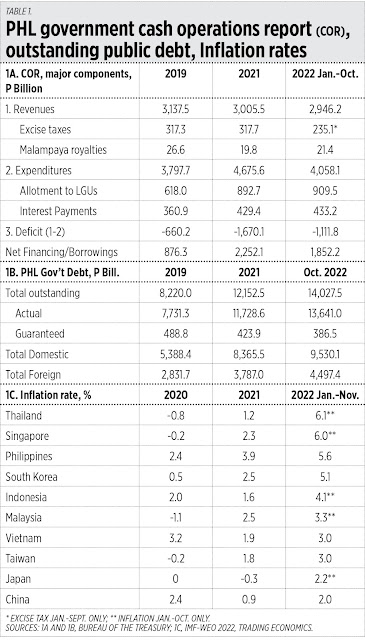Ten economic issues to watch
* BusinessWorld, December 12, 2022.
--------------
This column continues to monitor many economic issues and developments. There are 10 topics tackled here.
1. Public debt has reached P14 trillion
Last week, the Bureau of the Treasury released fiscal data for October 2022. The budget deficit has reached P1.1 trillion, interest payment alone is P43.3 billion/month average and likely to reach P520 billion by end of this year. Total outstanding public debt has reached P14 trillion, actual plus guaranteed. The public debt has been rising by P2 trillion/year from 2020 to 2022 or three years straight, not a good fiscal condition. The debt should significantly decline starting next year. Control should be on the spending side by the national government.
2. Inflation has reached 8%, a 14-year high
Also last week, the Philippine Statistics Authority (PSA) reported that November inflation was 8%, a 14-year high. This is indeed high, but taking the average for 2022, we have a 5.6% inflation rate so far, lower than Thailand and Singapore which experienced deflation in 2020, slight inflation in 2021, and now are at 6% (see Table 1).
3. The Maharlika Wealth Fund (MWF) bill amendment
After a strong public outcry, the authors of the MWF bill in Congress have removed the inclusion of SSS (Social Security System) and GSIS (Government Service Insurance System) funds for the initial capitalization. Good. As argued in this column last week, “State assets should finance the Philippine sovereign wealth fund” — use of Malampaya gas royalties is a good source. If Malampaya funds are used, then no new tax or mandatory contributions would need to be slapped on the people. And the amount generated by Malampaya is huge: P26.57 billion in 2019, P19.08 billion in 2020, P19.79 billion in 2021, and P21.44 billion in January-October 2022 alone.
4. Tobacco smuggling as economic sabotage
Last week, Congress passed on second reading House Bill (HB) 3917 which seeks to amend Republic Act (RA) 10845 or the Anti-Agricultural Smuggling Act of 2016. It will include the smuggling of tobacco products, manufactured or raw, as economic sabotage and a non-bailable offense. The original law includes only the smuggling of rice, sugar, corn, pork, poultry, fish, garlic, onion, carrots, and some other vegetables as economic sabotage.
Party-list Congresswoman Margarita Nograles, as co-author of the bill, cited Euromonitor’s estimate that 16.7% of all cigarettes sold in the Philippines are from illicit trade and the projected revenue losses to government is P26.2 billion in 2022 alone. Notice also in Table 1 that excise tax collections, which include tobacco tax revenues, in 2022 remain low. As tax rates increase, illicit trade and tax evasion also increase.
5. MUP pension reform
The military and uniformed personnel (MUP) pension is among Philippine taxpayers’ burdens. The good news is that there are attempts to address this, like HB 2556, or the “MUP Insurance Fund Act,” filed by Deputy Speaker Ralph Recto. For 2022 alone, the government has obligated P153.1 billion, equivalent to 89% of MUP base pay for the same year. The bill proposes to establish a government-guaranteed insurance fund to cover new entrants to be managed by the GSIS, and agency contributions equivalent to 21% of the total monthly base pay of MUP....
9. The Ruperto P. Alonzo lecture series
The UP School of Economics (UPSE) Program in Development Economics (PDE) Alumni Association has been revived. Elected as its new president is Senen Bacani, a former Education Undersecretary. Starting 2023, the association will organize a quarterly Ruperto P. Alonzo (RPA) lecture series, in honor of the long-time PDE Director, beloved by so many alumni, who passed away five years ago. Topics and speakers have been identified already for quarters 1 to 4 with a PDE alumni homecoming to be held in the second quarter.
10. The PPP Act
The first talk in the RPA lecture series will be held on Feb. 8, 2023 at the UPSE auditorium. It will be about Public-Private Partnership (PPP) and big infrastructure projects. The speaker will be Cynthia Hernandez, Executive Director of the PPP Center.
On this subject, Congress passed on second reading the bill on the “PPP Act.” I saw HB 2557 authored by Mr. Recto, and the provisions are good: automatic endorsement by the Regional Development Council for PPP projects which have complied with the requirements to avoid arbitrary delays, and the classification of infrastructure projects as “Projects of National Significance,” among others. And check again Table 1, local government units’ budgets will be rising — they should undertake more provincial PPP projects, and spare the National Government of more spending and borrowing.





Comments
Post a Comment